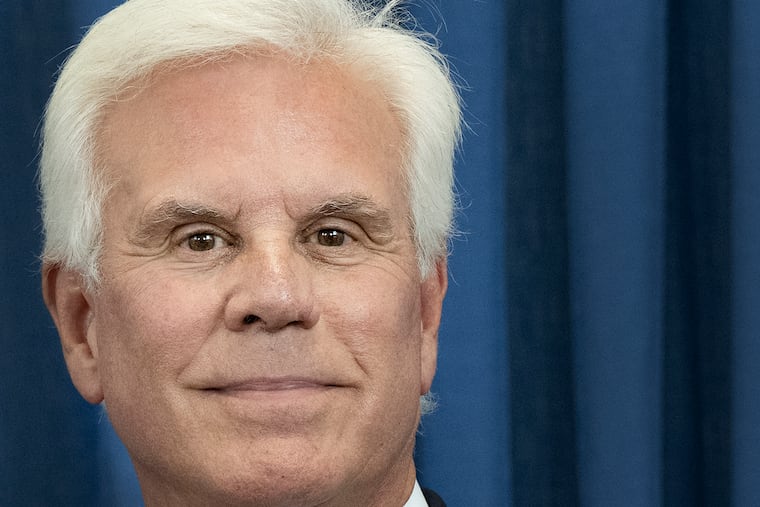Who is George Norcross? A look at the indicted South Jersey power broker
Norcross, 68, was charged Monday along with five allies in a state racketeering indictment.

South Jersey Democratic boss George E. Norcross III has never been elected to anything, but he’s salted dozens of municipal governments with loyalists of his political organization and amassed influence in the back rooms of Trenton and the marbled halls of Washington.
Governors, would-be governors, and U.S. senators have sought his advice and favor. Presidents know him and return his calls.
Norcross publicly chafes at terms like boss, kingmaker, and power broker, which sound unsavory.
But his modern brand of machine politics, built on loyalty and resentment of the wealthier and more populous North Jersey, would have been familiar to Tammany Hall Democrats who accumulated power by helping and organizing immigrants, workers, and poor people. They ran New York City in the late 19th and early 20th centuries.
“People in South Jersey were disenfranchised and ignored for far too long,” Norcross, who grew up the son of a labor leader in Pennsauken, said in a 2003 New York Times interview. It’s one of the few times he’s discussed the machine-boss characterization with the media.
Norcross, 68, was charged Monday along with five allies in a state racketeering indictment for using their influence over city government to corruptly acquire lucrative waterfront real estate and development rights in Camden.
» READ MORE: South Jersey power broker George Norcross, allies charged in sweeping racketeering case
The charges come amid a turbulent time for old-school New Jersey politicos and the county machines that have dominated primaries. U.S. Sen. Bob Menendez is standing trial, for the second time, on federal corruption charges.
The Norcross machine has in recent years suffered defeats at the ballot box, and lost an important tool of power in a March ruling by a federal judge requiring the redesign of state ballots, which had long benefited candidates backed by county party organizations like Norcross’. The case was brought by U.S. Rep. Andy Kim, a Burlington County Democrat who won the nomination for U.S. Senate earlier this month.
Last year, Norcross said that he was stepping away from an active role in politics. Many have expressed skepticism he’d truly withdraw from the fray.
Despite his passion for South Jersey, Norcross has a reputation as a bipartisan pragmatist. He forged a mutually beneficial alliance with Republican Gov. Chris Christie, who created the tax breaks for Camden development in 2013, for instance. He’s also allied with Newark Democrats and other political leaders in North Jersey at times.
» READ MORE: Read the full 13-count indictment against South Jersey power broker George Norcross
Norcross started a small insurance business in Camden in the early 1970s, helped by his father, George Norcross Jr., who was head of the AFL-CIO in South Jersey. The younger Norcross had been an indifferent student at Rutgers University-Camden, often spending time hanging around the courthouse to watch murder trails, according to his origin story.
As a young insurance man, Norcross met the Camden mayor at the time, Angelo Errichetti, who gave him his first and only government job: chairman of the Camden Parking Authority, as good a place as any to absorb the lessons of building political power.
Errichetti later was charged in the Abscam scandal, for arranging meetings between politicians and Arab businessmen seeking favors with bribes; the businessmen turned out to be undercover federal agents. Errichetti was convicted in 1981 of accepting some of the bribe money and sentenced to six years in prison, serving 32 months of it.
A federal judge presiding over the case said the mayor stood “at the center of a cesspool of corruption.” Norcross was never charged with a crime in the scheme. Neither was he implicated as having been involved.
Over the next 30-plus years, Norcross built his power as a prolific fundraiser for political candidates and partly using that leverage, by helping allies win municipal legal, engineering, and other contracts.
He also grew rich as a businessman and now is the executive chairman of Conner Strong & Buckelew, one of the nation’s largest brokers of insurance and consultants on risk management and employee benefits.
He’s also worked in banking and invested in other businesses and is chairman of the board of trustees of the Cooper University Health Care system, which includes Cooper University Hospital and the MD Anderson Cancer Center at Cooper.
In 2012, Norcross became a minority owner of The Inquirer but lost his ownership stake two years later after falling out with, and being outbid for the property by co-owners Lewis Katz and H.F. “Gerry” Lenfest. Today, The Inquirer is owned by the nonprofit Lenfest Institute for Journalism.
Also charged in Camden racketeering case
Philip A. Norcross, 61, of Philadelphia, Norcross brother and managing shareholder and CEO of law firm Parker McCay
William M. Tambussi, 66, of Brigantine, Norcross’ longtime attorney and lawyer for the Camden County Democratic Committee
Dana L. Redd, 56, of Sicklerville, former Camden mayor and current CEO of Camden Community Partnership
Sidney R. Brown, 67, of Philadelphia, CEO of NFI, a trucking and logistics company who also serves on the board at Cooper Health
John J. O’Donnell, 61, of Newtown, Pa., an executive at the Michaels Organization, a residential development company, and partner in groups that owned several of the Camden buildings at the center of the allegations